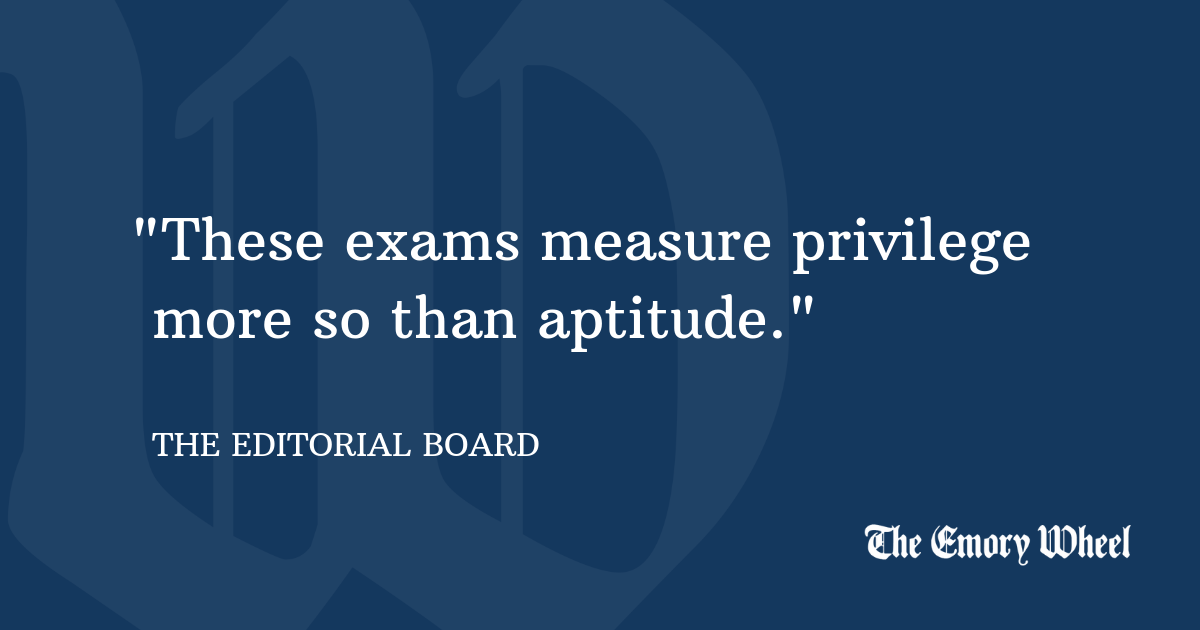In light of the recent national scandal surrounding college admissions, we should address the pervasive ways in which wealthy students are at an unfair advantage in the college admissions process. While Emory was not involved with this particular scheme, its standardized testing requirement demonstrates the influence of wealth on its admissions process. Emory College admitted a slim 4,512 out of 30,000 prospective students this year — a 15 percent admissions rate. The mean SAT score increased by 12 points to 1471 out of 1600. As admissions rates across the country continue to fall, Emory must keep its admissions process as fair as possible. To reduce the influence of wealth in that process, we urge Emory to become test-optional.
Although Emory claims to have a holistic admissions process which takes into consideration all aspects of the application, it still requires standardized test scores. These exams measure privilege more so than aptitude, as they are often far more representative of students’ ability to take advantage of the system rather than their intellectual ability. Expensive preparatory classes and exclusive tutors provide wealthy students a leg up on these tests, while registration fees can make even taking the exams at all a challenge for low-income students. Even if they can afford these expenses, students who work part-time or full-time jobs to support themselves and their family have less time to study for these extracurricular tests.
Emory has a vested interest in increasing its racial and economic diversity. According to the 2017-18 Common Data Set, 41 percent of Emory’s degree-seeking undergraduates are white, while only 8 percent are black or African American, and 9.4 percent identify as Hispanic/Latino. Additionally, only 20 percent of Emory freshmen came from families that were eligible for federal Pell grants in 2017-18. That number is higher at Emory than at some peer institutions. But roughly 60 percent of the U.S. population is eligible for Pell grants by earning less than $75,000 per year. Such numbers mean that minority and low-income students are underrepresented, and often unsupported, in the Emory community. These statistics also may discourage minority students from applying to Emory, as students may prioritize schools with larger minority communities instead.
Furthermore, recent research suggests that racial discrimination afflicts standardized testing even past the preparation stage. The SAT was created in 1926 by psychologist Carl Brigham in an effort to prove the intellectual superiority of white people. Research from the National Education Association shows that African American, Latino, Native American and Asian students continue to experience bias in standardized testing. Therefore, the reliance on these tests as a factor in college admissions makes the process even harder for low-income students and racial minorities.
While some argue that standardized testing creates a level playing field from which colleges and universities can accurately compare students from different schools by the same standard, the implementation of this practice is not an equal comparison. Some of Emory’s peer institutions have already taken steps away from standardized testing. George Washington University (D.C.) became test-optional in 2015, which did not negatively affect enrolled students’ academic success. At Wake Forest University (N.C.), the same result was found, in addition to increased diversity. The University of Chicago also stopped requiring standardized test scores last June.
The current admissions process is skewed toward the elite while remaining a battleground for the many. If Emory is committed to its values of diversity and inclusion, the admissions process must change to reflect those values.
The Editorial Board is composed of Zach Ball, Jacob Busch, Ryan Fan, Andrew Kliewer, Madeline Lutwyche, Boris Niyonzima, Omar Obregon-Cuebas, Shreya Pabbaraju, Madison Stephens and Kimia Tabatabaei.
The Editorial Board is the official voice of the Emory Wheel and is editorially separate from the Wheel's board of editors.





